#Franz von Papen
Text

Célébration de la fête nationale du peuple allemand – Lustgarten – Berlin – 1er mai 1933
De gauche à droite : Otto Meissner, Franz von Papen, Werner von Blomberg, Adolf Hitler et Joseph Goebbels
©Bundesarchiv - Bild 102-14571
#avant-guerre#pre war#fête nationale du peuple allemand#day of national work#fête du travail#1er mai#international worker's day#labour day#nazisme#nazism#otto meissner#franz von papen#werner von blomberg#adolf hitler#hitler#joseph goebbels#goebbels#lustgarten#berlin#allemagne#germany#01/05/1933#05/1933#1933
7 notes
·
View notes
Text

Trying to get a handle on my still-overlarge book collection that has to be paired down because A) I'm drowning in books and B) not any less visually impaired (making every book I keep more-or-less an act of sentiment).
Anyone want a stack of vaguely-homophobic imported Beano and Dandy comics from the late 90s to the early aughts?
What about my 1924 copy of the Victrola Guide to Opera?
My 1874 copy of Addison's On Torts?
The Complete Guide to Furniture Styles? Sexuality in Greek and Roman Society and Literature? The New York Library Desk Reference 1996? The New York Library Desk Reference American Edition? First edition copy of Franz von Papen's memoirs? The Worm Ouroboros? Raffles: The Amateur Cracksman? A bunch of not-very-good Steven Universe comics? Two volumes of the even-less-good Korra comics that decided to rank all the nations by most homophobic to least homophobic? The Star Trek Voyager cookbook?
(No you can't have my mint copy of Spider-man 2099 #1, my Latin copy of Winnie the Pooh, or my Stereoscopic Atlas of Human Anatomy Section II Head and Neck. Keeping those.)
#all my life I had people staring at me funny and going 'why do you know [this or that]'#I dunno I learned to read—did you not?#beano#dandy#star trek#star trek voyager#spider man#Franz von Papen#korra#steven universe#new york public library
9 notes
·
View notes
Photo

“Der Kampf mit dem Drachen der Not [Fighting the Dragon of Poverty / Destitution],” Simplicissimus. Vol. 37, issue 15, July 10, 1932.
----
Die Lanze der Verordnung sticht doch nur den Drachen leider nicht.
[Unfortunately, the lance of decree just doesn't pierce the dragon.]
A somewhat heroic St. George-ish Franz Von Papen tries to lance the dragon afflicting Germany with poverty, need, economic distress, and destitution, but the lance of ‘government decree’ kills only the victim, not the cause. Of course, one of the odd feelings reading old issues of Simplicissimus is that though we know von Papen as one of the gravediggers of German democracy, he is generally presented in these pages as a totally normal politician dealing with not so normal situation.
#social crisis#rule by decree#state of emergency#franz von papen#weimar republic#weimar germany#crisis of the weimar republic#capitalism in crisis#poverty relief#st. george and the dragon#weimarer republik#gravediggers of german democracy
12 notes
·
View notes
Text
1969-Franz von Papen date of death
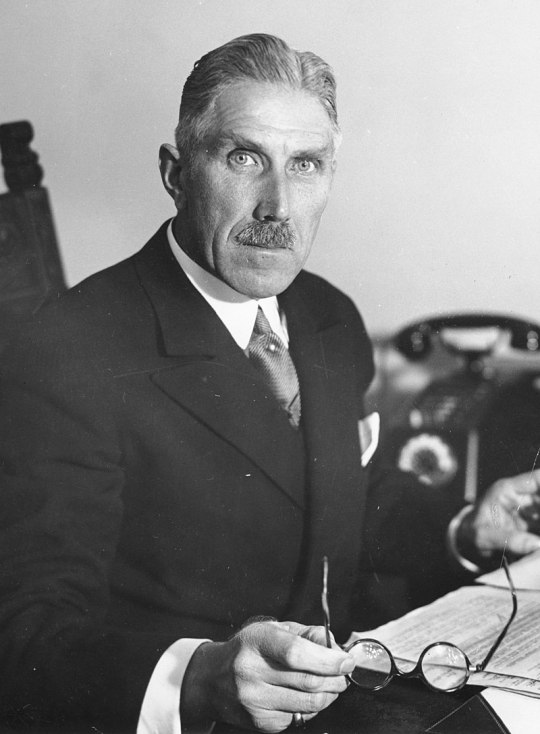
Franz Joseph Hermann Michael Maria von Papen, Erbsälzer zu Werl und Neuwerk ( 29 October 1879 – 2 May 1969) was a German conservative politician, diplomat, Prussian nobleman and General Staff officer. He served as the chancellor of Germany in 1932, and then as the vice-chancellor under Adolf Hitler from 1933 to 1934.
0 notes
Text
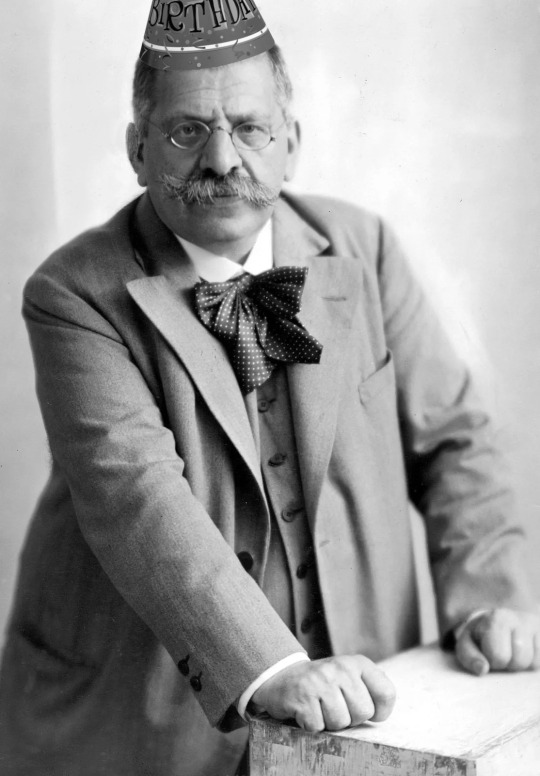
Happy birthday, Magnus Hirschfeld! (May 14, 1868)
A pioneering figure in the field of sexology, Magnus Hirschfeld was born in what is now Poland to an Ashkenazi family, the son of renowned physician Hermann Hirschfeld. After earning his medical degree, Hirschfeld spent some time in the United States and involved himself in the gay scene in Chicago, which would spur him to study sexuality and gender. Hirschfeld was struck by the universality of homosexuality and the fact that gay subcultures existed in most major cities, as well as the rate of suicide experienced by his gay patients. Hirschfeld worked tirelessly to normalize homosexuality in German society and foster greater acceptance, through both academic and political means. In the liberal atmosphere of Weimar Berlin, Hirschfeld found some measure of success, as the Social Democratic government of Prussia had no interest in enforcing federal laws against homosexuality. He founded the Institute for Sexual Research and built an immense archive of works relating to sexuality and gender research. Hirschfeld made the Institute his literal home, living there with his partner Karl Giese and his sister. Hirschfeld's fortunes would turn as first conservative Chancellor Franz von Papen seized the government of Prussia and began to crack down on homosexuality, and then the Nazi Party came to power in Germany. As a gay, Jewish socialist, Hirschfeld was a threefold target for the Nazis, and he never returned to Germany, having already been abroad on a speaking tour when the Nazis took power. The Institute was shut down and then ransacked, with its library burned. Hirschfeld would spend the rest of his life in Nice, France, dying in 1935.
“Soon the day will come when science will win victory over error, justice a victory over injustice, and human love a victory over human hatred and ignorance.”
341 notes
·
View notes
Text
Nuremberg Defendants: Part 2, Joachim von Ribbentrop - Nazi Foreign Minister

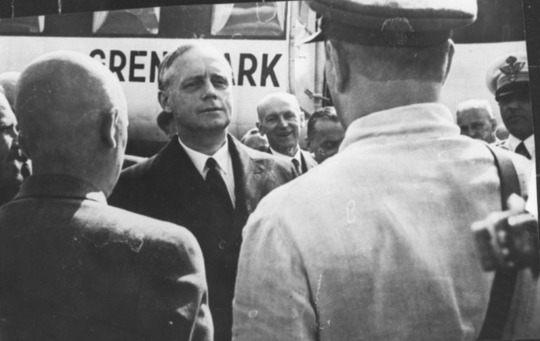
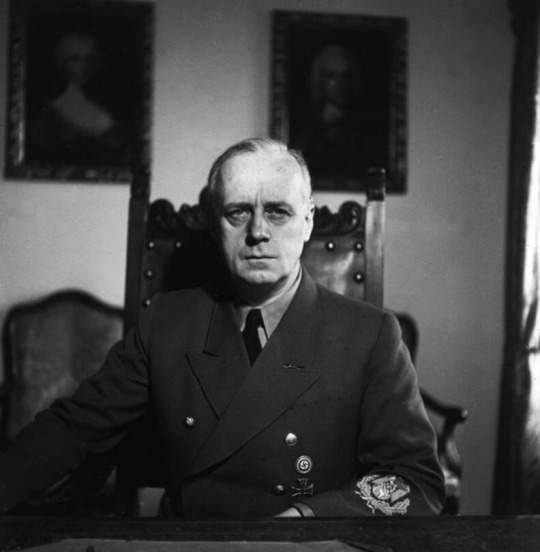
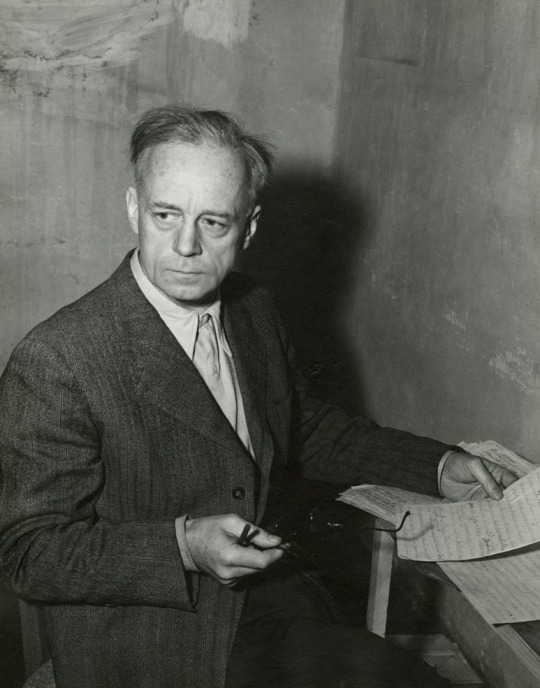
Continuing my Nuremberg Defendants series. Check links to see posts I've made on previous defendants (Hess wasn't part of the series, but I've already made a post about him):
Rudolf Hess
Alfred Rosenberg
-Joachim von Ribbentrop was born as Ulrich Friedrich Willy Joachim Ribbentrop on the 30th of April, 1893. He was not born into aristocracy (his father did not have the “von” in his name), Joachim grew up in an average middle class family with an older brother and a younger sister.
-Ribbentrop's mother died from tuberculosis when he was still very young. This event undoubtedly had an effect on him for the rest of his life (and I will explain in detail as we go further).
-He had no formal education after the age of fifteen. In school Ribbentrop was an underachiever and showed no signs of being an academic. His father had paid for French and English language tutors to teach him both languages.
-At seventeen, Joachim and his brother were sent to London for a year to polish up their English. After that year they both moved to Canada.
-Ribbentrop's life in Canada seemed to have been a happy one. He was popular, invited to many parties and was argued to have been sort of a ladies man. He worked as a banker and also as a construction worker, going on to help the reconstruction of the Quebec Bridge. Ribbentrop also had a passion for dancing and ice skating. he was even a member of a Canadian ice skating team.
-It was during this time that both Ribbentrop and his brother came down with tuberculosis. Ribbentrop's brother died, however Ribbentrop fortunately survived but had to have one of his kidneys removed. The effects of having his kidney removed were very clear. His left eye would sometimes droop, giving the effect of him looking tired. As a result he had a crippling inferiority complex.
-When the Great War broke out, Ribbentrop carefully returned to Germany to fight for his nation. It was during the war when Ribbentrop first met Franz von Papen (who will be the topic of a future post), a man that went on to become Chancellor under the Weimar Republic.
-After the war, Ribbentrop made a living out of his champagne business, which involved smuggling champagne from other countries. At this time, Ribbentrop was friends with Jewish people, even doing business with them. Ribbentrop was the only member of the inner circle that had previously moved around Jewish circles prior to joining the Nazi Party. He had no strong opinions at the time, people knew him as a moderately conservative monarchist. At elections he would vote for the DVP.
-Gradually Ribbentrop's personality began to change. Gone was the polite and somewhat shy young man, now he was becoming more insufferable as he went on long rants on the dangers of communism. What's more is that Ribbentrop had asked his aunt to adopt him aged in his early thirties so he could add the 'von' (a sign of German nobility - his aunt was a 'von Ribbentrop') to his name. His aunt agreed but was required to pay her a regular sum of money. When he stopped paying, his aunt took him to court and forced him to continue paying.
-In 1920, Ribbentrop married Anna Elisabeth Henkell (Annaliese to her friends). Anna's parents were not fond of Ribbentrop and considered him to be an idiot. The marriage produced five children, and Ribbentrop's eldest (Rudolf von Ribbentrop - born 1921) went on to serve in the Second World War as well as writing a book about his father post-war. Anna was a very ambitious woman and often pushed Ribbentrop around in all matters, including political. Hitler noted that it was clearly her who wore the trousers in the relationship.
-Fascinatingly, Ribbentrop didn't join the Nazi Party until 1932, which was around the time that Hitler was starting to get desperate for power. In late 1932, Hitler was using Ribbentrop's house to hold talks with Franz von Papen (as Papen was an old war friend of Ribbentrop's - and at this time Papen had lost his job as Chancellor of Germany, he was looking for a way to return to power. This moment in history is often referred to as the “Backstairs Intrigue”.)
-For the first few years of the Nazi regime, Ribbentrop had no government role. He mostly spent time in Britain and France, trying to establish connections for Hitler. In 1936, he was made Ambassador to Britain after the incumbent had died suddenly of a heart attack. Ribbentrop's appointment was unexpected, nor did he want the role. Prior to becoming ambassador, Ribbentrop was fond of holidaying in Britain and had hoped to one day retire in St Ives in Cornwall.
-He had a very bad reputation as ambassador and was dubbed 'von Brickendrop' due to his multiple gaffes while in this role. His most famous was when he almost knocked over King George VI by doing the Nazi greeting when the King had reached to shake Ribbentrop's hand. He was not well liked by the British Press nor the British public. Throughout his position (which lasted just over a year) he spent no longer than just a few weeks in London, mostly to stay close to his beloved Führer back home. Overall, his experience as Ambassador turned Ribbentrop from being an Anglophile to an Anglophobe.
-In 1938 Ribbentrop was made Foreign Minister, succeeding Konstantin von Neurath (who will be the topic of a future post). This was the position that Ribbentrop had dreamed of (and a position that his long-term enemy, Alfred Rosenberg, had also hoped for). In this role, Ribbentrop had significant influence over Hitler in the early years of World War 2, even encouraging Hitler to invade Poland despite threats from the British as he claimed “they would not fight seriously.” In this post, Ribbentrop's proudest achievement was his Molotov-Ribbentrop Pact (also referred to as the German-Soviet Nonaggression Pact). After the invasion of the Soviet Union in 1941, Ribbentrop gradually lost influence in his role as Foreign Minister.
-Ribbentrop's role in the Final Solution was fairly ambiguous, but he was most certainly aware that atrocities were taking place. Ribbentrop preferred to look the other way and have someone else do the work. From August 1941, Ribbentrop ordered all future communications sent to the Foreign office to be directed to the office of his subordinates. There is no evidence that Ribbentrop intervened in the exterminations, except on one occasion which was purely on the issue of jurisdiction, rather than humanity. Ribbentrop had involved himself in other war crimes, such as legalising and encouraging the lynching of captured Allied bomber crews in Germany. Although the likes of Göring opposed such measures, and the army favoured it in only a few circumstances, Ribbentrop wished to Lynch the perpetrators of 'every type of terror attack on the German population”, despite this being a violation of international law. This was the main charge against him on count 3 of the Nuremberg indictment (war crimes).
-From 1945, Ribbentrop was essentially powerless. After the suicide of Hitler on the 30th of April (ironic because that's also Ribbentrop's birthday), Ribbentrop fled to Flensburg in an attempt to secure a role in the Dönitz government. Ribbentrop was quickly turned down and so fled to Hamburg, where he went by the alias Johann Riese. He was captured by the British after his whereabouts had been exposed. Ribbentrop was discovered asleep, wearing pink and white pyjamas and a small tin of poison attached to his genitals. Upon being woken up, he began to mumble nervously in German, but as soon as he became conscious of the situation, he spoke in perfect English a prepared speech: “The game is up. I congratulate you. You know who I am. If you had come two days later, I would have already given myself up voluntarily.” The British had also discovered a letter written by Ribbentrop to “Vincent Churchill” (not a spelling mistake on my part, that's Ribbentrop's mistake).
-At Nuremberg, Ribbentrop was a depressed and broken man. So much so that his lawyer (Dr Martin Horn) feared he was close to a psychological breakdown. In fact, Ribbentrop was considered one of the worst suicide risks at Nuremberg, and prison Psychiatrist Dr Kelley was instructed to keep a close eye on him. Ribbentrop's first lawyer was Dr Fritz Sauter (who was also acting for Baldur von Schirach - a subject of a future post), however at the start of 1946 he ceased to be his lawyer either because Ribbentrop dismissed him or he resigned out of exasperation (sources differ on this). Ribbentrop was therefore represented by Dr Martin Horn. On the witness stand, Ribbentrop was a mess and had a tendency to ramble and contradict himself.
-Ribbentrop was found guilty on all four counts of the Nuremberg indictment and was sentenced to death by hanging. He spent his last few days closely studying his Bible. After the unexpected suicide of Göring on the night of the executions, Ribbentrop was the first to be hung. On the scaffold his last words were: “God protect Germany, God have mercy on my soul. My final wish is that Germany should recover her unity, and that, for the sake of peace, there should be understanding between East and West.” He then turned to the Protestant Pastor Gerecke and said “I'll see you again.” Ribbentrop's hanging was badly botched, his neck didn't snap when falling through the trapdoor, therefore strangling him to death. Ribbentrop took around 10-20 minutes to die.
27 notes
·
View notes
Text
#OTD in 1915 – The Infamous Sabotage Order Against The U.S. and Roger Casement.
The Imperial German Admiralty requested that the military and naval attachés in Washington, Franz von Papen and Karl Boy-Ed respectively, initiate sabotage in the United States and Canada. This request only surfaced as a memorandum in the Imperial Foreign Office. Initially, the Admiralty envisioned the Irish nationalists to conduct sabotage operations in the U.S. This understanding resulted from…
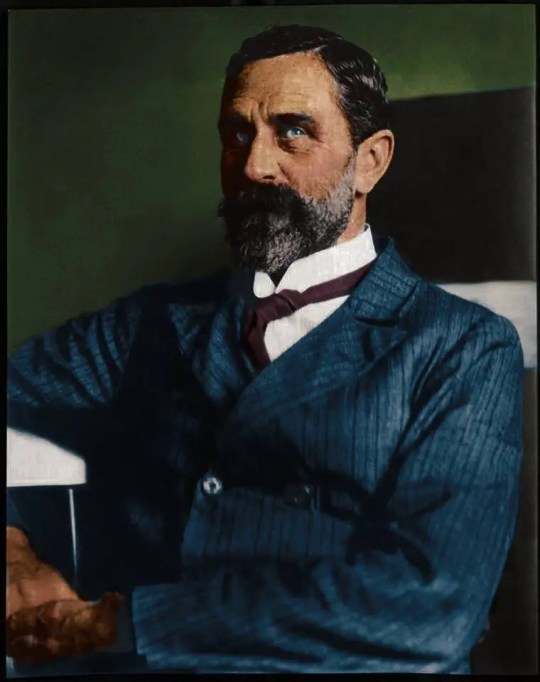
View On WordPress
#1916 Easter Rising#Canada#England#Germany#Irish Brigade#Roger Casement#Sir Roger Casement#Source: Heribert von Feilitzsch#The Infamous Sabotage Order Against The U.S.#United States
7 notes
·
View notes
Text

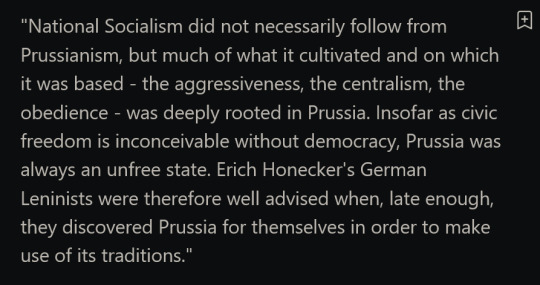
@makwandis, found it: "Prussia was always an unfree state" (Erbe und Erinnerung – Preußen 2001/2002)
Original Language (+ more quotes):
Nicht nur der Toleranzmythos wurde relativiert, auch warfen manche Autoren die Frage nach der geistigen Verwandtschaft zwischen totalitären Systemen des 20. Jahrhunderts und Preußen neu auf. Bemerkenswert war in diesem Zusammenhang ein Essay des Ostberliner Schriftstellers Rolf Schneider in der konservativen Berliner Tageszeitung »Berliner Morgenpost«.[13] Darin schrieb Schneider:
»Der Nationalsozialismus folgte nicht zwingend aus dem Preußentum, doch vieles von dem, was er kultivierte und worauf er fußte, die Aggressivität, der Zentralismus, der Gehorsam, war in Preußen tief verankert. Sofern staatsbürgerliche Freiheit nicht denkbar ist ohne Demokratie, war Preußen stets ein unfreier Staat. Erich Honeckers deutsche Leninisten waren also gut beraten, als sie, spät genug, Preußen für sich entdeckten, um sich seine Überlieferungen nutzbar zu machen.«
Also good quotes from Staat von Blut und Eisen:
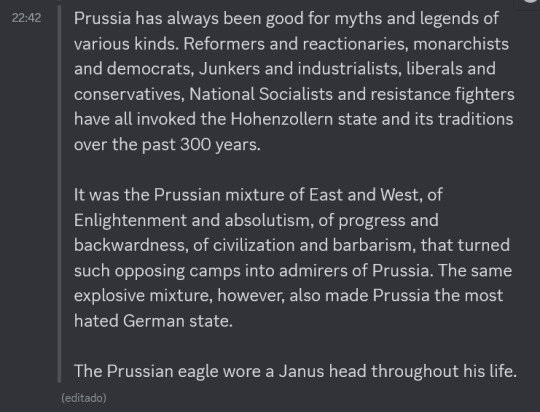
Preußen war schon immer für Mythen und Legenden unterschiedlichster Art gut. Auf den Hohenzollernstaat und seine Traditionen beriefen sich in den letzten 300 Jahren Reformer und Reaktionäre, Monarchisten und Demokraten, Junker und Industrielle, Liberale und Konservative, Nationalsozialisten und Widerstandskämpfer.
Es war die preußische Mischung aus Ost und West, aus Aufklärung und Absolutismus, aus Fortschritt und Rückständigkeit, aus Zivilisation und Barbarei, die so gegensätzliche Lager zu Bewunderern Preußens machte. Die gleiche explosive Mixtur ließ Preußen allerdings auch zum meistgehassten deutschen Staat werden.
Der preußische Adler trug Zeit seines Lebens einen Januskopf.

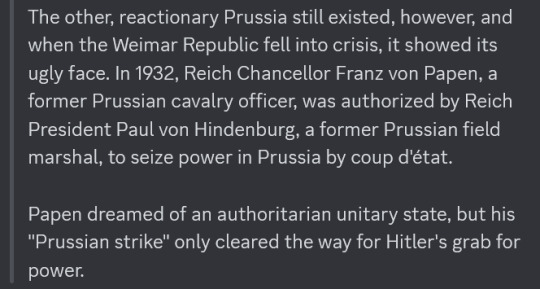
Preußen wurde ein Freistaat in der Weimarer Republik, und was jetzt, ohne die Hohenzollern, kam, waren die besten Jahre in der preußischen Geschichte; zum Bestandteil des Preußenmythos zählten sie leider nie. (…)
Das andere, reaktionäre Preußen gab es allerdings auch noch, und als die Weimarer Republik in die Krise geriet, zeigte es seine hässliche Fratze. 1932 ließ sich Reichskanzler Franz von Papen, ein ehemaliger preußischer Kavallerie-Offizier, von Reichspräsident Paul von Hindenburg, einem ehemaligen preußischen Generalfeldmarschall, ermächtigen, per Staatsstreich in Preußen die Macht zu übernehmen.
Papen träumte von einem autoritären Einheitsstaat, doch mit seinem »Preußenschlag« machte er nur den Weg frei für Hitlers Griff nach der Macht.
6 notes
·
View notes
Text
Britain is no longer on a descent towards fascism, it is a fascist country.
The government is openly and proudly committing human rights abuses and pledging to commit more and the state broadcaster is silencing anyone who even mildly criticises the government line
And our opposition? Our brave representatives in the Labour Party? They’re not only pathetically following the government, they’ve purged themselves of anyone with any human decency. They’re Franz von Papen
This country deserves to burn
14 notes
·
View notes
Text
Es ist nicht nur Thüringen.
Aber in der Tat wird das das erste Land sein, in dem AfD & CDU koalieren. Das war schon zweimal geplant und wurde beide Male durch ein Machtwort von Merkel verhindert. Merkel ist aber nicht mehr da. Also wird es 2024 passieren.
Zudem gibt es eine historische Parallele: 1932 war Thüringen das erste, deutsche Land, welches von der NSDAP regiert wurde. Allerdings gehörte Erfurt damals noch nicht dazu. Das gehörte zu Preußen, wo im selben Jahr die demokratisch gewählte SPD-Regierung durch Franz von Papen abgesetzt wurde. Demselben, der am 30. Januar 1933 zusammen mit Hitler regieren wollte.
Es ist mehr als bezeichnend, dass der hessische Ministerpräsident Boris Rhein derzeit massiv gegen die CDU Thüringen schießt, während aus Bayern neben unverhohlenem Beifall NICHTS zu dem Thema zu hören ist. Im Wahlkampf sind schließlich beide. Und beide haben reelle Chancen, am Ende den Thron zu besteigen.
2 notes
·
View notes
Text
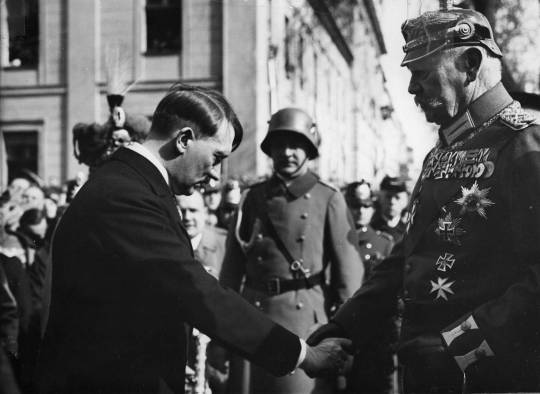
Adolf Hitler s'incline devant le maréchal Paul von Hindenburg pour l'accueillir devant l’église de la Garnison à Potsdam - Journée de Potsdam - Allemagne - 21 mars 1933
Photographe : Theo Eisenhart
©Deutsches Bundesarchiv - 183-S38324

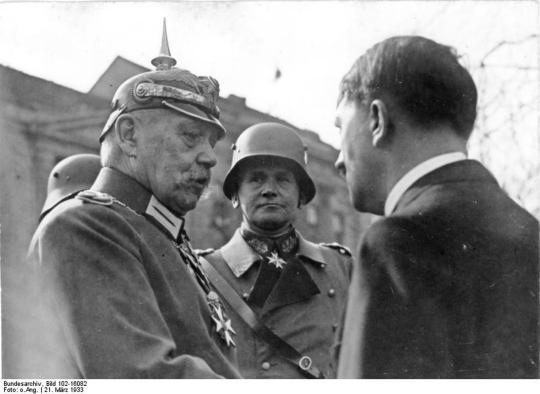
Le Président allemand Paul von Hindenburg, le Ministre de la défense Werner von Blomberg et le Chancelier Adolf Hitler devant l’église de la Garnison à Potsdam – Allemagne – 21 mars 1933
Photographe : Georg Pahl
©Bundesarchiv - Bild 102-16082
La journée de Potsdam
Suite aux élections législatives de novembre 1932, Adolf Hitler est nommé Chancelier de la République de Weimar le 30 janvier 1933 bien que sa popularité dans les urnes a baissé (perte de 2 millions de voix et de 34 sièges au Reichstag).
Au bout d'un mois d'intrigues menées au plus haut sommet par l'ancien chancelier Franz von Papen avec le soutien de la droite, d'industriels et du Parti Populaire National Allemand (DNVP) le Président Paul von Hindenburg consent à le nommer à ce poste.
Dès le 1er février 1933, Hitler persuade Hindenburg de dissoudre le Reichstag. Les neuvièmes élections fédérales allemandes du 5 mars 1933 donnent la majorité des sièges au parti nazi (NSDAP) sans toutefois obtenir la majorité absolue en vue de faire adopter sa loi des pleins pouvoirs.
Suite à l'incendie du Reichstag dans la nuit du 27 au 28 février, dont la responsabilité a été attribuée aux communistes selon les nazis, il fallut trouver un endroit pour accueillir le nouveau parlement et solenniser le début de la nouvelle législature en rassurant les milieux conservateurs et religieux sur la fidélité et la continuité des traditions allemandes du projet hitlérien. A cette fin, Hitler doit s’assurer du soutien des conservateurs et du parti catholique du Zentrum pour adopter à la majorité des deux tiers son projet de loi des pleins pouvoirs qui lui octroierait le droit de gouverner par décret.
L’église de la Garnison de Potsdam, sanctuaire de la tradition prussienne, fut choisie pour cette cérémonie, le jour anniversaire de l’inauguration du premier Reichstag de l’Empire allemand par le chancelier Otto von Bismarck en 1871.
Le lendemain de la cérémonie, les deux premiers camps de concentration officiels furent établis à Dachau et à Oranienburg.
Deux jours plus tard, la loi des pleins pouvoirs fut adoptée et marqua le début de la dictature nazie.
#WWII#avant-guerre#pre-war#nazisme#nazism#journée de potsdam#potsdam day#hitler#von hindenburg#von blomberg#potsdam#allemagne#germany#21/03/1933#03/1933#1933
2 notes
·
View notes
Text

Pera Palace...
The hotel that is full of mysteries, stories, and memories.
If you are a mystery hunter, this hotel is the perfect match for you!
Even though it's in the heart of the city, you step into a whole different century.
Pera Palace was renovated several times, however, most of the building was kept as original from the ballroom to the rooms.
It's not only a hotel, it's a living museum, a book that you can't get enough of.
Till this date, some mysteries have never been solved.
Pera Palace was the first high-standard, luxury hotel in İstanbul. It was built back in the day, at the end of the 19th century, with an order from the Ottoman Emperor when electricity was not available in most of the buildings. It was the first hotel to establish an electric lift and you may still see it in the hotel with its elegant design.
The aim of the order of the Ottoman Sultan was to host foreign guests arriving to Constantinople via the famous Orient Express.
Pera Palace opened her gates in 1895 to host the passengers of the world-famous Orient Express. The train brought world-famous guests such as Ernest Hemingway, Zsa Zsa Gabor, King VIII. Edward, Queen II. Elizabeth, Austro-Hungarian Emperar Franz Joseph, Shah Reza Pahlavi, President of Yugoslavia Josip Broz Tito, General Franz Von Papen, Greta Garbo, Alfred Hitchcock, Pierre Loti, Jacqueline Kennedy, Mata Hari, and the most memorable ones are world famous murder novel writer Agatha Christie and of course Founder of the Turkish Republic, Mustafa Kemal Atatürk.
Atatürk used to stay in Suite 101 frequently between December 1915 and October 1917. On the 100th anniversary of his birth, 1981, the room transformed into a museum. Even if you're not staying at the hotel, you can visit the room and see the mysterious carpets that were given to him years before his death with symbolisms of his death date and time. Back in the day, the debate about how the owners of the carpets knew the details about his death, was printed in the newspapers of the time. You will see the elephants and birds symbolizing death, a clock that shows 09.08, November flowers, and 10 glasses on the carpet. Atatürk died on November 10th, at 09.05.
Do you think it was some sorcery, a mediumship, or a planned threat? Nobody knows who sent the carpets to this date and the mystery was never solved.
Another mystery is about Agatha Christie. She used to stay in Room 411, where she wrote her world-famous novel, “Murder on the Orient Express”. After her death, Warner Bros wanted to make a film about her life and went to a psychic, Tamara Rand, to find out about the missing 11 days of her life. Rumors say she called the author's soul to receive information and her soul told the filmmakers that the secret is hidden in the Pera Palace Hotel and added that she witnessed Christie hiding a key under the floorboards in her room. The key was supposed to open a hidden room in the hotel and there should be a notebook about those missing days.
The key was found where the medium describes it! The medium wanted to have another session to ask Christie’s soul about the location of the notebook, but there were disagreements between the hotel management and filmmakers, and the hotel didn't give away the key, and notebook was never found and the mystery was never solved.
To learn more about the other mysteries and details contact us.
#istanbul#istanbulite#turkey#travel#luxury travel#luxurytravel#privatetour#private tour#mystery#Perapalace#agatha christie#murder on the orient express#warnerbros#atatürk#hemingway#ernest hemingway#unsolved mysteries#unsolved mysteries of istanbul#mysterious hotel
0 notes
Text
“In such circumstances the tension between Ernst Thälmann’s footdragging on the issue of nationalism and Moscow’s priorities came to a head over the tactics to adopt when the Nazis forced a plebiscite to oust the social democratic government of Prussia. The vote was due on 9 August 1931. Under Thälmann’s direction, on 15 July the Kommunistische Partei Deutschlands leadership decided as a matter of principle to abstain. Any association with the Nazis was ruled out. Even the more radical Heinz Neumann appeared to go along with the decision. “Some” of the comrades in Moscow at Comintern’s secretariat also thought this the correct line to take: probably the moderate Kuusinen and doubtless the sinuous but not unintelligent Manuilsky. But as soon as word spread, others—probably the leftists Pyatnitsky and Vil’gel’m Knorin, egged on by Neumann—appealed over the heads of the German leadership to Stalin.
...
The Prussian plebiscite proved a dangerous fiasco that destroyed any chance of a united front against fascism in Germany and yet failed to make the KPD a credible voice for nationalism. A great victory was declared by Comintern and the KPD—Neumann, indeed, claimed that the central government and the Prussian administration were now “peeing in their pants”—even though insufficient numbers voted to oust the SPD from power in Prussia. All this did was to alienate social democrats even further, and not just them. The shortfall was attributable not least to the fact that core Communist districts failed to participate. This was, indeed, a serious matter. Most supporters of the KPD were simply unwilling to throw out the socialists. The doctrine of social fascism was thus effectively being ignored among the rank and file of the party. Stalin’s opportunism had tipped the largest Communist party in Europe, and therefore Moscow’s best asset, into prolonged crisis.
...
Before long Manuilsky could be heard acknowledging that fascism had not been blocked in Germany as “some comrades” had asserted, and that “in fact in no country had the growth of fascism been brought to a halt”. Worse still, the party in Germany appeared to be all over the place. On 17 November 1931 the KPD daily Die Rote Fahne spoke of Social Democracy as the main menace. Five days later it named the Centre Party. Comintern’s German policy was in tatters. But the underlying reason for the chaos was unmentionable, even within the walls of Comintern: Soviet state interests, as conceived by Stalin, had to be served. At all costs the Centre Party and the Social Democratic Party of Germany had to be removed from the levers of power or the convergence between debt-ridden Germany and the Entente would continue, leaving Moscow isolated and therefore vulnerable to the emergence of a hostile coalition.
The KPD was lambasted for not doing enough to combat the Nazis, who were seen by the party as fundamentally “anti-capitalist” and passively making gains on the back of dissatisfaction with government. They were seen as doing a better job of exploiting discontent, the implication being that the Communists should learn from them. Indeed, Thälmann made a Freudian slip in rating Hugenberg’s nationalist party against “the not so right-wing [sic] party of the Nazis”. Inevitably the KPD was bewildered and demoralised by signals from Moscow. As late in the day as 10 April 1932 Stalin was still insisting that “the main blow” should be aimed at Social Democracy. And this was after the presidential elections of 12 March, when Hitler obtained 30.1% of the vote against Thälmann’s tiny 13.2% and Hindenburg’s 49.6%.
The disconcerting spectacle all too visible to Comintern was that the Nazis were making alarming headway in recruiting from workers in enterprises where the Communists had been predominant. It soon became obvious where former KPD activists were going. KPD party membership rose as never before, but these were new members. Moreover, the numbers voting Communist in key working-class districts of Berlin such as Wedding and Friedrichshain were lower than in the May 1928 elections. All of this was cause for “serious alarm”. In this respect Thälmann’s speech to Comintern’s executive committee on 19 May was scarcely reassuring.
Thälmann was inevitably depressed by the outcome of the elections. It was a defeat generally recognised as such within Comintern, despite Pyatnitsky’s attempts to lighten the blow with reassuring denials. Yet Thälmann clearly understood that his hands were largely tied by Comintern’s commitment to the doctrine of social fascism. The KPD could not block the election of a Nazi to the Prussian Landtag “because it is not permissible to enter into horsetrading with Social Democracy and even less with the Centre as the governing party”. Moreover, his analysis of the Nazi Party and its growing popularity was bleak but spot-on:
The question is: why has the National Socialist Party such a colossal following? It is not only a question of the party being so active. It is not only a question of it conducting massive agitation and propaganda; it is not only a question of the millions provided by the bourgeoisie for these elections and other elections; but it also has to do with the existence of chauvinist and nationalist sentiment in Germany.… The Hitler movement positions itself as the movement that fights against the system and enables it to mobilise expressions of discontent and anti-capitalist opinion in Germany (general opposition to the Versailles system is also very strong) into their ranks.
...
Even diehards at Comintern headquarters momentarily began to suspect that they might be on the road to catastrophe when a new coalition government emerged on 1 June 1932 under the leadership of Franz von Papen for the Centre Party. With defeat staring him in the face, Knorin, the ultra-leftist heading Comintern’s Central European secretariat, panicked and raised the alarm:
Our party must now make every effort to reorganise itself in expectation of being outlawed. History has never known an instance of an 800,000- member party being forced underground. But we are now faced with … such a possibility.
Knorin now openly admitted that
Germany has a decisive significance for Comintern. Should fascism succeed in wiping out the resistance of the working class, should fascism succeed in forcing our party underground for a long time … then this would mean a colossal growth of the reactionary camp, it would mean fascism across the face of Europe.
Indeed.
...
On 4 April 1932 Stalin had told Thälmann’s nemesis, Neumann, that he was preoccupied with military matters and that left no time for Comintern. At this stage of the Depression other governments were increasingly sensitive to Comintern activity because of its international reach, even though the organisation was at its most sectarian and was therefore losing rather than gaining members. In May the Swiss minister in Rome had an audience with Mussolini, who in a bid to dominate the table played the anti-Communist card:
He told me that the four European great powers, France, Germany, England, and Italy, have to restore order in Europe; otherwise we are heading for one of the most serious social crises, the bolshevisation of Europe. Bolshevik propaganda is pervasive everywhere in all guises. Our bourgeois class is itself completely penetrated. Throughout Europe, not excluding Italy, the working class is convinced that the Bolshevik régime has succeeded.
It is by no means certain that knowing this would have reassured the Soviet leadership; rather the reverse is possible. The common fear of Bolshevism without doubt cemented relations between the antagonistic capitalist powers. Secret intelligence indicated that the German government was seeking common ground with the French at Soviet expense. Indeed, at the Lausanne conference of the major European powers on 29 June Papen, who counted on the Americans to ease reparations payments, proposed military conversations with the French for common action against the Soviet Union—a proposal that was, no doubt to Stalin’s relief, dismissed out of hand. Anxious not to make matters worse, given Papen’s fierce anti-Communism, Stalin vented his fury at “disastrous” attacks launched on the Papen government by the Soviet press. The consequences of his immediate priorities soon became apparent.
Comintern’s secretariat was largely on its own. It was frozen in place by Stalin’s previous decisions without any flexibility permitted to improvise policy for the KPD. In addition, Stalin’s habit of confiding in Neumann, who had nominally been in the dock since the spring of 1930 over his ultra-leftism, seriously undermined the authority both of Comintern’s secretariat and of Thälmann. Only shortly after he had made the case for anticipating a fascist coup Knorin, along with Pyatnitsky, refused to go along with a proposal made by Thälmann, who wanted to stop the election of a Nazi as chairman of the Prussian parliament even by means of voting for a socialist or Centre Party candidate and had the agreement of the majority within Comintern’s secretariat.
In Moscow the heightened vigilance during that summer proved all too brief. It dropped precipitously when the Reichstag elections on 6 November 1932 fortuitously delivered a rise in votes for the KPD and a fall in support for the Nazi Party. This inevitably sent a welcome wave of euphoria through Comintern and the German Communist leadership, who were now tempted to believe that the crisis was finally past. It proved a fatally beguiling mirage. One clue to the staying power of unrealism was the obviously demoralising consequence of acknowledging how far policy hitherto had been misdirected.”
- Jonathan Haslam, The Spectre of War: International Communism and the Origins of World War II. Princeton & Oxford: Princeton University Press, 2021. pp. 121-127.
#kommunistische partei deutschlands#comintern#weimar republic#weimar germany#crisis of the weimar republic#international relations#communism#soviet union#ernst thalmann#franz von papen#lausanne conference#national socialism#social fascism#nsdap#german politics#stalinism#german history#academic quote
1 note
·
View note
Text
İçimizdeki Nazi
Selahattin Çelik
Konu okuyucuya sıkıntı verse de ben dediğimde direteceğim, çünkü Nazizmi bir şekilde yaşıyoruz.
Faşizm (1922, İtalya), Nazizm (1933, Almanya) ve Flanjistler (1939, İspanya), üçü de birbirinin eşdeğeri, emperyalist akımlardır. Faşizm, talancılıktır, işgalciliktir, militarizmdir, özgürlüklere düşmanlıktır. Ama en ayırıcı özelliği, ırkçılığının dozudur. Faşizm ırkları/kültürleri imha hedefi yapar. Şu Hitler’e maledilir: “Yahudiler olmasaydı ne yapardın?” Cevabı: “Yaratır, öyle katlederdim.”
Her emperyalist egemenlikte faşizm vardır
Nazizm Avrupa’da etkin olduğunda, birçok ülke onu izlemiş, faşist parti ve hareketler ortaya çıkmıştı. İngiltere ve ABD’de faşist-ırkçı hareketler, İtalya ve Almanya’dan çok önce boy vermişti.
İngilizler, 1919’da Kuzey İrlanda’ya asker emeklisi ırkçı lümpenlerden oluşan “Black and Tans” isimli katliam birliklerini göndermişti.
ABD’de “Ku Klux Klan”ın tarihi 1865’e kadar gidiyor. Bugünkü Trump’ın babasının Mayıs 1927’de Ku Klux Klan’ın bir saldırısında yer aldığı için tutuklandığı iddiası vardır (The Washington Post, 29.02.2016, Phillp Bump).
Irkçı kardeşlik
Osmanlılar (İttihat ve Terakki), 1915’te bir buçuk milyon Ermeni kattetti. Bu, çağın ilk ve en büyük soykırımı idi. Hitler, 12 milyonluk dünya Yahudi nüfusunun 3 milyonunu öldürmüştü. Ermeniler ise 3 milyondu ve yarısı katledilmişti.
İttihat ve Terakki’nin ırkçı yayılmacı “Pan-Türkist” gibi tezlerinin arkasında Ernst Jäckh gibi Alman ırkçı uzmanlar vardı.
Ermeni soykırımında Almanlar, Türkleri silahla donatmışlardı. Alman subayların denetiminde, İstanbul-Bağdat demiryolu Ermeni transportunda kullanılmıştı.
İşte Yahudi soykırımından önceki Hitler’in sözleri: “Türkler o kadar Ermeni öldürdüler. Dünyadan ses çıktı mı?” Hitler yeni yetmeydi. Kıyımın üstadı Türklerdi.
Kemalistler o geleneği muhafaza ettiler. 1930’larda Kadro dergisi, faşist tezlerle Kemalist ideolojiyi oluşturma çalışması yürüttü. Öyle ki Mustafa Kemal, kafatasçı uzmanlar bile getirtiyordu.
Kemalist ırkçılığın hedefi Kürtlerdi. Kürtler, “Güneş Dil Teorisi”, “Türk Tarih Tezi” gibi ırkçı tezlerin denekleriydi.
CHP, o ırkçı zemin üzerinde kuruldu. Aradan neredeyse bir yüzyıl geçti. CHP halen o tezleri savunuyor. Haliyle ırkçı kelimesini hak ediyor.
Bugün birçok kişi, gazeteci sıfatıyla AKP iktidarına tetikçilik yapıyor, insan tutuklatıyor, hatta ölümlere sebep oluyorlar. 1990’lı yıllarda Kemalist tetikçiler bunu yapıyordu. Bunlardan biri Emin Çölaşan’dı. Kurbanlarından biri şimdi aramızda olmayan Yaşar Kaya idi. Az çok adalet sahibi bir ülkede Çölaşan ve onun gibiler yargılanır, ağır ceza alırlar. Bu pislikler basında asla yer bulamazlardı.
CHP ne yaptı? CHP’li Ankara Çankaya Belediyesi, Emin Çölaşan adına park açtı. CHP, Kürtleri katledenleri onurlandırıyor. Kararı siz verin.
Naziler Türkiye’deki uşaklarına para saçıyorlardı. MHP’nin öncülü olan Çınaraltı, Orhun, Dönüm, Türk Yurdu gibi dergi ve gruplar değil sadece, Kemalist gazete ve gruplar da Naziler’den otlanıyordu.
Hitler Sovyetlere saldırdığında (1941), İsmet İnönü ve generalleri Bakü petrolleri için zafer naraları atıyor, birbirini kutluyorlardı.
Hitler, Kerkük petrolüne de göz dikmişti. Nazilerin büyükelçisi Franz von Papen, 1940’ta Ankara’da Bağdat hükümeti bakanlarıyla ilişki kuruyordu. Bağdat’ta Başbakan Reşit Ali ve generalleri, “Cennette Allah, dünyada Hitler” diyecek kadar Hitlerci idiler. Alman Lawrence, Fritz Grobbe işbaşında idi.
Türk egemenleri kurnaz ve kalleş idiler. Hitler’e uzak durma karşılığında Hatay’ı almışlar, Hitler savaşı kaybedince de ABD yardımlarını almak için savaş açmış, Nazi yanlısı organları sözde kapatıyorlardı.
Türk Nazizmine ne ad vereceğiz?
Tarih nettir: Türk egemenleri hiçbir zaman Nazilerden kopmadılar. Kapıları faşizme her zaman açık oldu.
Saddam’ın katliamlarını kazın. Sosyalist devletlerden destek alan Baas şiddetinin kodları, Bağdat-Nazi Berlin işbirliğine kadar uzanır. Bugünkü Türk iktidarının şiddetini kazın, kökü Kemalist diktatörlük ve İttihatı Terakki’ye uzanır.
Her vesileyle Erdoğan’ın Güney ve Batı Kürdistan’ı egemenlik alanında gördüğünü yazıyorum. Vurgum, bazıların hoşuna gitmiyor. Öyle mi?
Türkiye’de hükümete stratejik öngörülerde bulunan “Yeni Türkiye” isimli bir dergi var. Patronu eski bakanlardan ırkçı Hasan Celal Güzel gözüküyor. “Misak-ı Milli” özel sayısı çıktı (Ocak-Şubat 2017). Önsözü Erdoğan yazmış. Harita da var. Güney ve Batı Kürdistan, Hewler ve Kerkük, hatta Doğu Kürdistan’ın büyük kesimi, Misak-ı Milli içinde gösteriliyor. Fazla söze gerek var mıdır?
Saddam, Enfal’i yaptı. Enfal, soykırımdır. Enfal’in rejisörleri Arap ırkçılarıydı, faşist idiler. Peki 2015-2016’de Kuzey Kürdistan’da olanlar? Enfal değil midir? Ya o vahşetin rejisörü Türkler?
Almanya tepki vermeye başladı
“- 15.07.2016 darbesi, Gülen Cemaati’nin kârı değil (İstihbarat örgütü BND).
Savaşı durduran Öcalan mı terörist, yoksa demokratik muhalefeti susturan, özgürlüklere düşman Erdoğan mı? (ARD, 20.03.2017).
Erdoğan bir İslami cemaat lideridir (yani cumhurbaşkanı değil).
Almanya’ya Nazi suçlaması yapmak, Alman yasalarına göre suçtur. Erdoğan’a karşı ceza davası açılmalıdır”...
Berlin’in asıl problemi Trump’la, yoksa Erdoğan’la uğraşmak işten değil.
Avrupa’daki Kürtlerin, provakasyonlara karşı oldukça duyarlı olmaları gereği ortaya çıkıyor. Dönemin taşkınlıklara tahammülü yok.
1 note
·
View note
Text
1932-Altona Bloody Sunday


A riot between the Nazi Party paramilitary forces, the SS and SA, and the German Communist Party ensues.
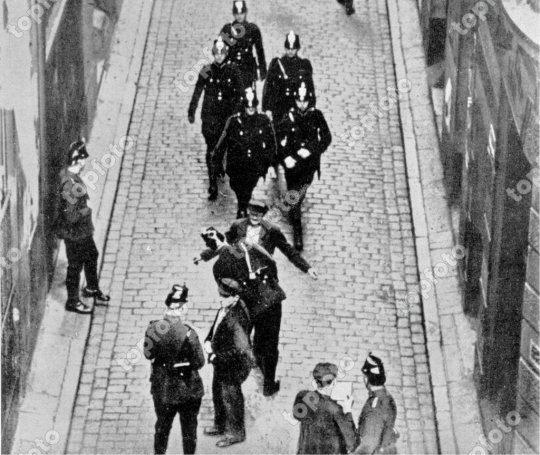
Altona Bloody Sunday (German: Altonaer Blutsonntag) is the name given to the events of 17 July 1932 when a recruitment march by the Nazi SA led to violent clashes between the police, the SA and supporters of the Communist Party of Germany (KPD) in Altona, which at the time belonged to the Prussian province of Schleswig-Holstein but is now part of Hamburg. Eighteen people were killed. The national government under Reich Chancellor Franz von Papen and Reich President Paul von Hindenburg used the incident as a rationale to depose the acting government of the Free State of Prussia by means of an emergency decree in what came to be known as the Prussian coup d'état of 20 July 1932.
1 note
·
View note
Text
The Spandau Seven
Despite having a name that sounds like a cheesy nineties boyband or even some form of crappy Justice League, 'The Spandau Seven' was the name given to the Nazi war criminals who had been handed down prison sentences. These seven were held in Spandau Prison in West Berlin, a prison designed to hold 600 inmates, built in 1876 and demolished in 1987 shortly after the death of it's final remaining prisoner, Rudolf Hess. This post will go over the seven Spandau inmates briefly, from prisoner 1 to prisoner 7.
Prisoner No.1: Baldur von Schirach

Baldur von Schirach started off as the Reichsjugendführer (Reich Youth Leader) and Reichsführer for the Hitler Youth. From 1940 until the end of WW2, von Schirach became Gauleiter of Vienna. At the Nuremberg Trials, he was found guilty of Crimes Against Humanity and sentenced to twenty years in prison. He was the youngest of the prisoners, aged 40 when he arrived. Eugene Bird describes him in his book "The Loneliest Man in the World" as a "tall, superior man, hair brushed back from his forehead, an air of aloofness about him." as well as "arrogant" and "knowledgeable". During his time in prison he went through a divorce with his wife Henriette, and had suffered a detached retina which had to be operated on. He was released from prison on the 1st of October 1966 having served his full sentence. He died in 1974, aged just 67.
Prisoner No.2: Karl Dönitz

From 1943, Karl Dönitz (a career naval officer) had replaced Erich Raeder (we'll get to him later) as Commander-in-chief of the navy and Grand Admiral of the Naval High Command. In Hitler's last will and testament, Hitler named Dönitz as the Reichspräsident and the Supreme Commander of the Armed Forces. Under his order, the instrument of unconditional surrender was signed, marking the end of WW2 in Europe. At the Nuremberg Trials, he was found guilty of Planning, Initiating and Waging Wars of Aggression Crimes Against the Laws of War. He was sentenced to ten years in prison. He was released on the 30th of September 1956, having served his full sentence. He died in 1980, aged 89.
Prisoner No.3: Konstantin von Neurath
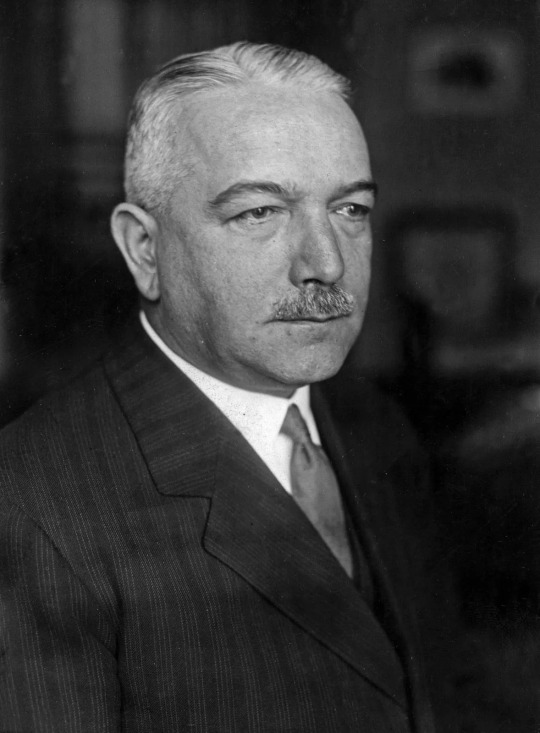
Konstantin von Neurath was a diplomat by career, having even worked for the SPD Weimar president Friedrich Ebert before the rise of the Nazi Party. He is probably most notable for serving as the Minister for Foreign Affairs under previous chancellor Franz von Papen and then under Hitler, a post which he held from 1932 until 1937 from which he was succeeded by the more compliant Joachim von Ribbentrop. He was subsequently made Reichsprotektor of Bohemia and Moravia. He remained a member of the Nazi government until 1943. At the Nuremberg Trials he was found guilty on all four counts, but the tribunal acknowledged that his successor, Joachim von Ribbentrop, was more culpable for the atrocities committed under the Nazis than Neurath was, and so was sentenced to only fifteen years in prison. However, von Neurath was released early on the 6th of November 1954 on the grounds of advanced age and ill health. He died two years later, aged 83.
Prisoner No.4: Erich Raeder

Erich Raeder was the former Grand Admiral and Commander-in-chief of the Navy, prior to the appointment of Karl Dönitz in 1943 after Raeder's resignation. At Nuremberg he was found guilty of Conspiracy to Commit Crimes Against Peace; Planning, Initiating, and Waging Wars of Aggression; and Crimes Against the Laws of War and was sentenced to life imprisonment. Raeder was released early on the grounds of ill-health however on the 26th of September 1955. He died five years later, aged 84.
Prisoner No.5: Albert Speer
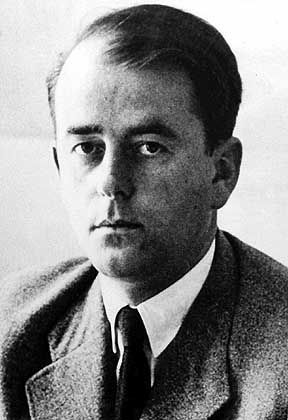
Albert Speer had started off as Hitler's architect. He had been commissioned by many of the Nazi inner circle (including Göring, Goebbels and von Ribbentrop) for the design and construction of new homes for them, as well as the 1934 Nuremberg Rally which is arguably his most well-known work. Speer had a very close relationship with Hitler, with some regarding him as Hitler's "only real friend". In 1942, after a plane crash caused the death of Dr Fritz Todt (which Speer had in fact narrowly avoided himself!), Speer was appointed as the Minister of Armaments and Munitions and held this position until the end of the war. At Nuremberg, Speer was found guilty of War Crimes and Crimes Against Humanity (on the grounds of his use of slave and forced labour). He was sentenced to twenty years in prison (this was the result of a compromise, some of the judges wanted Speer to hang). Eugene Bird described him in his book as "hard-working, pleasant, resigned to his remaining time in prison." During his time in prison, Speer would keep a record of the distances he walked each day as part of his 'world tour', and had claimed to have walked more than 30,000 kilometres. Speer's parents also died during his incarceration. He was released from prison on the 1st of October 1966 and became a media sensation, giving countless interviews (as well as that one Playboy interview). He died in 1981, aged 76.
Prisoner No.6: Walther Funk

Walther Funk was an economist. He was made Reich Minister for Economic Affairs in 1938 and President of the Reichsbank in 1939, and he held both of these posts until the end of the war. In these roles he signed laws that "aryanized" Jewish property and as Reichsbank President he accepted the forwarding of gold teeth extracted from concentration camp victims to be melted down to yield bullion. At the Nuremberg Trials, he was charged with Planning, Initiating and Waging Wars of Aggression, War Crimes and Crimes Against Humanity and was sentenced to life imprisonment. Eugene Bird described him as the "sad clown". Due to failing health he was released on the 16th of May 1957. He died three years later, aged 69.
Prisoner No.7: Rudolf Hess
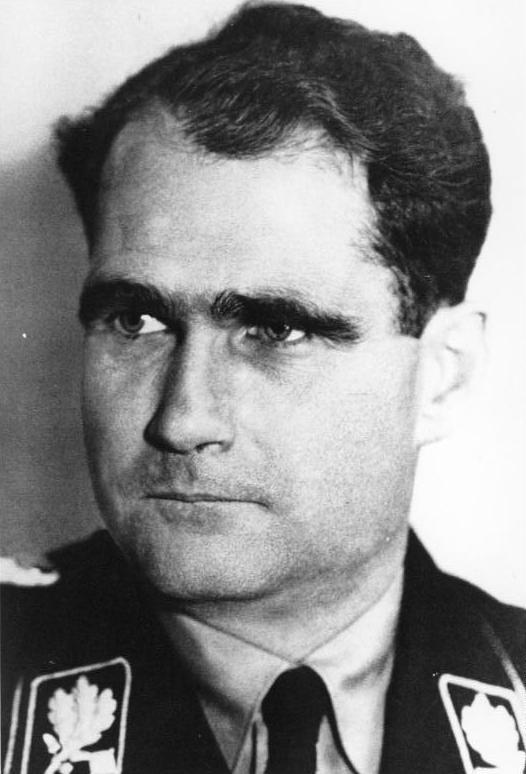
Rudolf Hess was Deputy Führer of the Nazi Party and third in line to the role of Führer (behind Reichsmarschall Hermann Göring) in the event of Hitler's death up until 1941. In May of 1941, Hess took off in a Messerschmitt from Augsburg and flew to Scotland in an attempt to begin peace talks with the British in the Second World War. His attempt massively backfired and was apprehended as a prisoner of war. While in prison, Hess began to show signs of memory loss and would sometimes refuse to eat as he claimed he was being poisoned by the British. At the Nuremberg Trials he admitted that this amnesia was simulated. He was charged with Conspiracy to Commit Crimes Against Peace and Planing, Initiating, and Waging Wars of Aggression, but due to his flight to Britain he was found not guilty of War Crimes or Crimes Against Humanity. He was sentenced to life imprisonment and the Soviets made sure that he would serve out his full sentence. During his time in prison, Eugene Bird had made an attempt to get close to Hess. He described him in his book as "cantankerous", "difficult to manage", and a "problem-child". From 1966 until his death he was the sole prisoner. Although Raeder and Funk (who were also imprisoned for life) were released from prison on grounds of ill health, this was never the case for Rudolf Hess. In late 1969, Hess was taken into hospital for a stomach ulcer and it seemed as though he was close to death. However, despite this, Hess was not released. Support was growing for Hess's release in Germany as well as three of the four allied nations (UK, US and France). The Soviets vetoed every attempt to release him. Rudolf Hess died in Spandau Prison on the 17th of August 1987 at the age of 93, reportedly of suicide, however debate remains as to whether he really committed suicide or whether he was murdered. Shortly after his death, Spandau Prison was destroyed to prevent it becoming a shrine for Neo-Nazi pilgrimages.
#reichblr#rudolf hess#baldur von schirach#albert speer#Konstantin von neurath#walther funk#karl dönitz#Erich raeder#spandau prison#ww2
25 notes
·
View notes